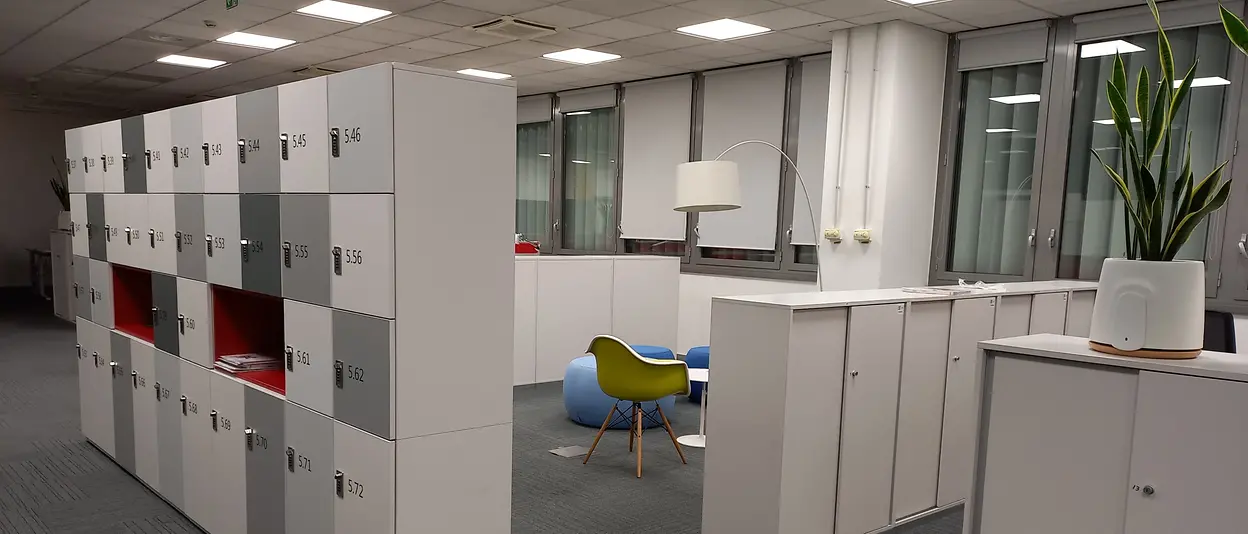Scopri i marchi delle nostre divisioni: Adhesive Technologies e Consumer Brands.
LAVORARE IN HENKEL ITALIAMETTIAMO LE PERSONE AL CENTRO

C’era una volta l’ufficio, le postazioni con il telefono e il computer, le sale riunioni con un grande tavolo al centro. Poi il mondo è cambiato. Nell’equilibrio ormai consolidato tra smart working e lavoro in presenza, oggi le organizzazioni sono più flessibili e dinamiche, e difficilmente passiamo un’intera giornata seduti alla scrivania. Collaboriamo con team più o meno ampi per raggiungere i nostri obiettivi e usiamo le tecnologie digitali per comunicare, progettare, condividere.
Una nuova modalità di lavoro porta con sé anche una diversa visione degli ambienti e degli spazi. Quando siamo in ufficio, tutta la sede (non solo la nostra postazione!) è luogo di lavoro. In Henkel Italia, questa evoluzione si è concretizzata in un progetto che, mettendo al centro la persona e il suo benessere fisico e psichico, ha completamente ridisegnato la sede di Milano e guidato il rinnovamento di alcuni siti produttivi.
Spazi più funzionali, più piacevoli, più Henkel
Con AMORETTI PIÙ, nel corso del 2024 gli uffici di Milano hanno cambiato volto e gli spazi sono stati riorganizzati per offrire maggiore libertà, favorire la collaborazione fra colleghi e facilitare gli incontri con clienti e partner.
Gli open space sono stati rimodulati in modo da avere zone in cui le persone dello stesso team possono lavorare fianco a fianco, e zone in cui le postazioni sono condivise, superando la vecchia idea della “mia scrivania”. Le sale meeting sono state ampliate e diversificate, rendendo disponibili luoghi per riunioni strutturate, focus room per incontri ristretti, aree aperte per conversazioni informali. Il grande spazio Agorà può essere modulato e allestito in modi diversi per organizzare presentazioni, mostre ed eventi.
AMORETTI PIÙ ha pensato anche all’outdoor. In Henkel Italia ci sono ora una lounge esterna, accessibile tutto l’anno per chi desidera pranzare oppure lavorare all’aria aperta, e una splendida terrazza che può ospitare piccoli eventi.
Insieme agli spazi, sono stati arricchiti i servizi per i dipendenti e i collaboratori. Oltre alla mensa gratuita e le aree break presenti in ogni piano della sede, il bar offre l’opportunità per un momento di relax, magari in compagnia di un collega o un ospite. Tra le novità ci sono poi il servizio lavanderia, la palestra, dove allenarsi liberamente oppure seguire i corsi in programma, e l’ambulatorio dove è possibile prenotare alcune tipologie di visite mediche.
La sostenibilità è un altro aspetto centrale di AMORETTI PIÙ. In Henkel Italia sono da anni operative pratiche virtuose per la sicurezza delle persone, il risparmio energetico, la riduzione dei consumi di acqua e dei rifiuti. Un ulteriore passo in avanti è stato fatto con l’installazione dei pannelli fotovoltaici sul tetto e delle colonnine per la ricarica delle auto elettriche nel parcheggio aziendale.
Le persone al centro
Non è solo questione di spazi e luoghi. Lavorare in Henkel Italia significa essere parte di un’azienda dinamica, una cultura vivace, un team che merita fiducia. Lo spirito pionieristico del nostro fondatore Fritz Henkel continua a vivere ancora oggi. Sentiamo che il nostro lavoro ha uno scopo che va oltre il raggiungimento di un obiettivo: vogliamo contribuire a progetti e innovazioni che abbiano un impatto sulla vita e il benessere degli altri, e della società in generale.
Per questo incoraggiamo le persone a lasciare il segno, premiamo i talenti e il merito, offriamo opportunità di crescita professionale e personale attraverso esperienze internazionali oppure esplorando diversi ruoli e posizioni nel corso della propria carriera.
L’attenzione alle persone è una priorità assoluta. Accanto ai risultati, da noi contano il rispetto, l’ascolto, la condivisione, l’inclusione. Nei nostri uffici e nei siti produttivi lavorano 4 generazioni, dai boomer ai giovani della GenZ, e colleghi differenti per genere, età, caratteristiche, talenti e attitudini, ma anche per etnia, orientamento sessuale, convinzioni e valori: la diversità non è un ostacolo, piuttosto una ricchezza.
Crediamo nel potere dell’unicità e nella forza che nasce dal mettere insieme persone diverse. In Henkel Italia ci impegniamo ogni giorno a rendere la nostra organizzazione sempre più inclusiva, un luogo in cui ciascuno possa esprimersi senza sopportare discriminazioni o pregiudizi, abbia pari opportunità rispetto ai colleghi, venga valutato sulla base di ciò che fa – non di ciò che è.








